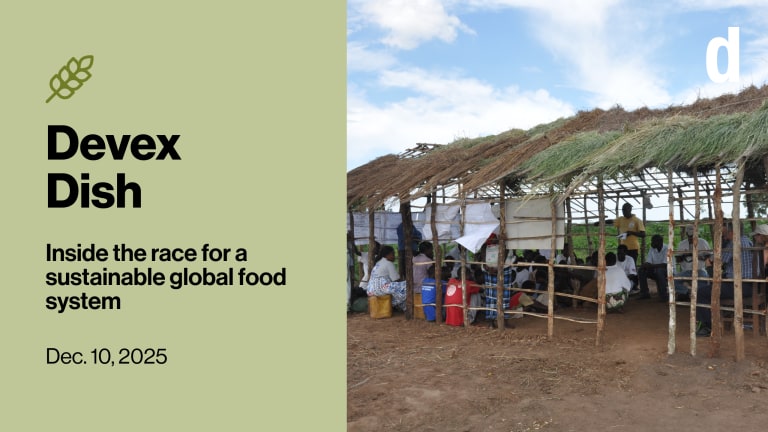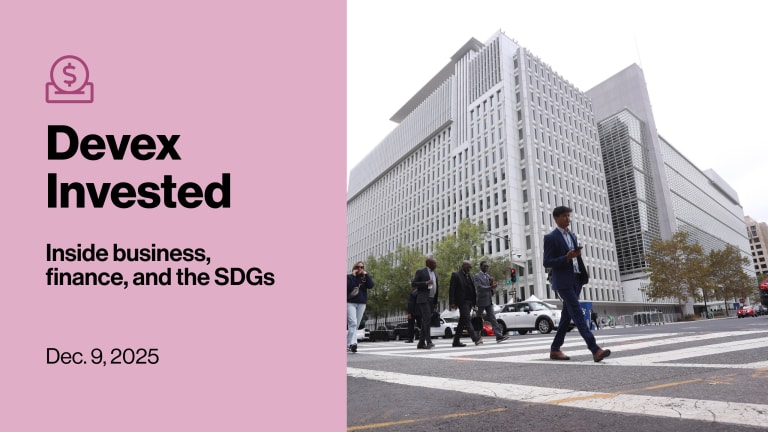
NAIROBI — Last week, the United Nations World Food Programme announced that it helped to broker the largest debt swap in the agency’s history — a deal between Russia and Mozambique. Russia agreed to waive Mozambique’s public debt, freeing up $40 million that the Mozambican government has committed to the WFP to implement a school meal program for 150,000 children.
The WFP is planning to expand its use of debt-for-development swaps with other nations. The mechanism allows “countries to mobilize and utilize domestic resources in a fiscally sound, internationally coordinated and responsible manner,” Chris Kaye, WFP director of the Government Partnerships Division, told Devex.
Debt-for-development swaps involve nations forgiving debts from other nations, as long as the indebted nation channels the funds into development projects.
WFP has used this type of financing mechanism in the past on a smaller scale, with Germany, France, and Italy. The agency is currently working on a debt swap with France for Africa’s Sahel region, as well as debt swaps with Russia in southern Africa, among others, Kaye said.
“While in the past WFP was advancing with small steps, carefully assessing the feasibility and potential obstacles of this kind of arrangement, we are now confident that debt swaps provide a significant tangible opportunity and model for achieving Zero Hunger,” he said. “Based on this experience, we are confident that these approaches need to be further pursued with the broader donor community.”
Debt swaps allow countries to increase social spending without increasing taxes or national debt, according to Kaye. They also give governments more ownership over development projects. In Mozambique, the government will be assuming full financial and political responsibility for the school feeding program.
The $40 million is expected to last for five years, tapping into an already existing national food program where the WFP is partnering with the government. The WFP expects that during those five years, the government will gain the capacity to fund and manage the program even after the debt swap arrangement is finished.
Conversations on the swap started in 2013, after Russia and Mozambique reached an agreement to waive the latter country’s debt if the country committed to investing the money in development. The following year, Russia and WFP agreed on moving forward with a debt swap.
In 2015, the parties began negotiations on the project design and implementation, which took about two years. WFP’s role included helping to facilitate the discussions to create a proposal based on the school food program.
From the Russian side, the negotiations involved the Ministry of Finance, Russia’s Permanent Representative to the U.N. Food and Agriculture Organization and other U.N. agencies, and the Russian Embassy in Maputo. Mozambique’s Ministry of Economy and Finance and Ministry of Education negotiated on behalf of Mozambique. Discussions took place in Moscow, Maputo, and Rome, where the WFP is headquartered.
Throughout the negotiations, the challenge was identifying where the money should be invested in order to “guarantee that the debt relief gains will not be squandered by inefficiency (and corruption),” Kaye said by email. WFP was chosen to implement the program in part because of its extensive operational presence in Mozambique, including a food supply chain network, he said.
Mozambique will commit $8 million per year to a special account for development programs, which will be transferred to WFP.
Debt swaps may not work in every context, Kaye said. Fragile or failed states are not good candidates, for example, as they tend to have weak governments and fiscal policies. Debt swaps also would not be ideal for rapid emergency responses, because of the complex nature of the multi-party negotiations.
There is growing interest in this type of funding model in the development sector, as efforts to find innovative financing methods expand, Kaye said.
“We expect this approach to be replicable and to generate additional and multi-year funding to WFP’s operations, which could be particularly relevant for addressing the root causes of hunger and promoting investments in resilience,” he said.
Read more Devex coverage on the World Food Programme.








